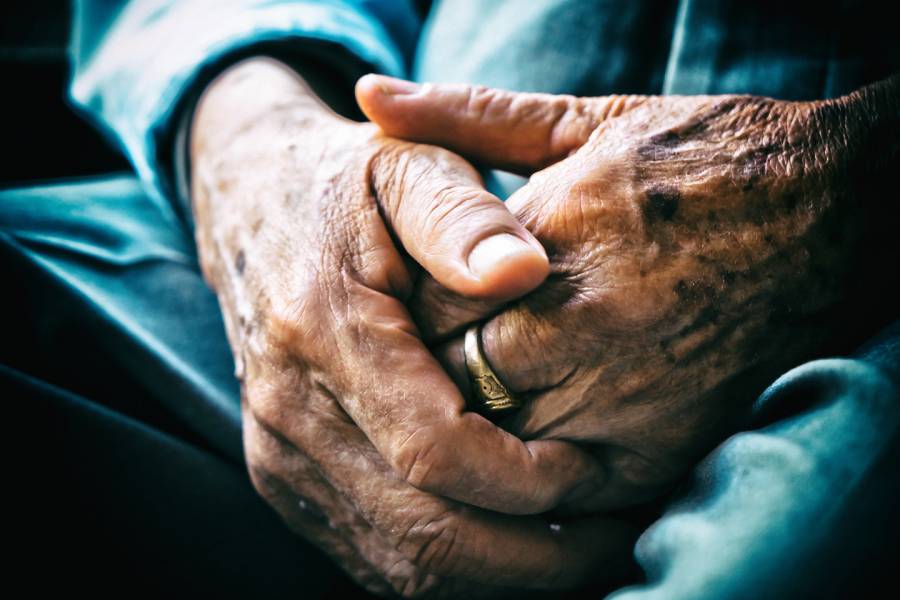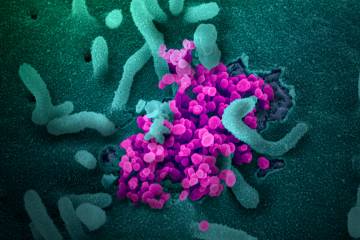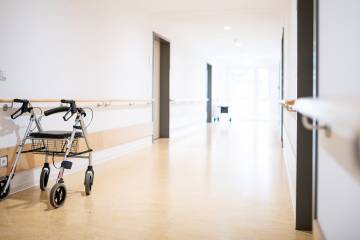Before becoming a professor, Sarah Szanton made house calls to older adults as a nurse practitioner. On her visits, she saw how an older person's home environment can contribute to health outcomes. Now, as the Endowed Professor for Health Equity and Social Justice at the Johns Hopkins School of Nursing and the director of the Center for Innovative Care in Aging, Szanton works to identify solutions to narrow racial and socioeconomic disparities for older people.
Szanton joined one of her PhD student mentees, Sarah LaFave, to discuss the challenges that COVID-19 poses for older adults. This conversation has been edited for length and clarity.
How is the COVID-19 pandemic affecting older people differently than younger generations?
Older adults are more likely to have dire outcomes from the virus. It can also be a challenge to prevent older people from being exposed to the virus because they may not be be fully independent. For example, a mother might rely on her adult daughter to come and help her with groceries or take a shower. As another example, some older people depend on help from a family member or friend with sorting mail and sending in checks to pay bills. At this point, people may not have had someone come into the home to help with those kinds of things for many weeks. What happens if one of those unpaid bills is for an essential resource or accrues a lot of interest during this time?
We also have to think about all of the ways that the pandemic affects older people's lives beyond morbidity and mortality from the virus itself. I am concerned about people experiencing social isolation as a result of not being able to have visitors and not being able to go out and do things with other people. The effects are compounded for any older person who doesn't have access to technology platforms like Skype and FaceTime or who has limited access to phone calls. Many lower-income older people have pay-per-minute phone plans, for example, and may have to choose between using their limited minutes for a phone visit with a doctor or a conversation with a grandchild. So we can't assume that a switch to virtual socialization or virtual access to resources is going to work for all older people.
Also, I think there's a fair amount of ageism—of people thinking right now, even if they aren't saying it out loud, "Well, older people are going to die anyway." But who are we to say that an 80-year-old wouldn't have otherwise lived to be 100 and done a lot of wonderful things in those 20 years? We would never think that the first 20 years of someone's life don't matter; we should recognize that the last 20 years are just as valuable.
Has the pandemic exacerbated health disparities for older adults?
Every experience in life is influenced by a person's access to resources and, in the United States, a person's race, socioeconomic status, and other characteristics have profound impacts on access to resources. It can be easy to jump to saying, "Oh, well, that person was older and had diabetes, so of course they had a worse outcome from COVID." But you have to take a step back and ask what contributed to the person having diabetes in the first place. Because race is not biological, we know that it's not race itself that causes disparities in co-morbidities and in COVID outcomes—it's the relationship between race and resources. For example, my colleague Laura Samuel has found that the counties that have a high proportion of people who have to spend more than a third of their income on housing have higher COVID mortality rates. If we had a society that was structured so that everyone had the same chance at health, we would not see the disparities we are seeing.
A lot of the potential solutions to health disparities among older adults don't exist in the health care system itself—they occur further upstream. Things like widening access to the federal Supplemental Nutrition Assistance Program, addressing food deserts, and supporting returning citizens in the workforce all relate directly to health, but we don't always think that way.
What challenges has COVID-19 raised for family caregivers of older adults?
First, if family caregivers have jobs that require them to be in regular contact with others, such as bus drivers or nurses, they may have to decide between not providing essential help to an older loved one and risking passing the virus to that person.
Second, direct care workers continue to come in and out of hospitals, nursing homes, and senior living buildings and are being screened upon entrance, but very few family caregivers are allowed into these same facilities right now. In some cases, family caregivers are not being recognized as essential parts of the health care team, and I think they should be. Hospitals and nursing homes have had to place restrictions on visitors for safety reasons, but I think some of those policies may be too limiting. For example, delirium is a very common and very costly issue for older adults who are admitted to hospitals. There is a better chance of preventing and managing delirium if a family member can help attend to the day-night sleep cycle, keep the person oriented, hydrated, and so on. True delirium uses so many health care resources that it can benefit all of us if an older person has a familiar caregiver with them during an inpatient stay. Of course, a major limitation is that there isn't enough personal protective equipment right now, so you have to weigh the risks and benefits of tapping into a finite supply of protective equipment.
What can people do right now to support older adults in their communities during this crisis?
There are many volunteer opportunities. For example, Baltimore Neighbors Network is a coalition of community partners that trains and supports volunteers to provide companionship and resource navigation assistance to older adults in Baltimore, which includes remote options such as phone calls. If people can't volunteer for a program like that right now, maybe they can give blood, or maybe they can take the money they would usually spend eating out each month and instead contribute financially to a food pantry. People can also support their older family members or friends by asking the person what would be most helpful to them—maybe it's dropping off a meal on a front porch, maybe it's mailing a letter. It's really important to remember, even during a crisis, to make time for our elders.
Posted in Health, Voices+Opinion, Politics+Society
Tagged aging, eldercare, sarah szanton, coronavirus, covid-19










